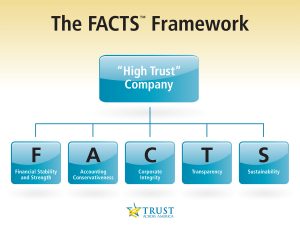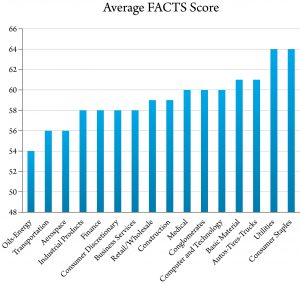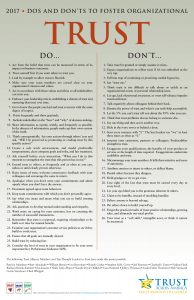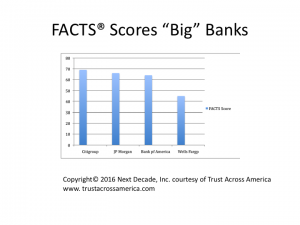Trust Across America Announces
2017 Most Trustworthy Public Companies by State
via its new Corporate Integrity Monitor (the corporate Richter Scale of Trust)
| State | Company Name |
| California | Nvidia |
| Connecticut | Xerox |
| Florida | CSX |
| Georgia | Home Depot |
| Illinois | Abbott Labs |
| Massachusetts | TJX |
| Michigan | Delphi Auto |
| Minnesota | Best Buy |
| New Jersey | Johnson & Johnson |
| New York | Morgan Stanley |
| North Carolina | VF Corp |
| Ohio | Cliffs Natural |
| Pennsylvania | Hershey |
| Texas | Dr Pepper Snapple |
| Virginia | Altria |
(Russell 1000 only) States listed above are those with the most Fortune 500 companies according to this article.
Methodology: Since 2009 Trust Across America’s FACTS® Framework has been measuring and ranking public companies on five equally weighted quantitative indicators of trustworthiness and integrity, forming the acronym FACTS: Financial stability, Accounting conservativeness, Corporate governance, Transparency and Sustainability.
Our objective model (there is no “pay to play,” companies do not know they are being analyzed nor are any internal employee surveys completed) was initially constructed in 2008 and measures the corporate trustworthiness/integrity of the largest 2000 US public companies. Trust Across America’s Most Trustworthy Public Companies ranks the Russell 1000.
This, by order of magnitude, is the most comprehensive and fact-based ongoing study on this subject. We analyze quarterly and rank order by company, sector and market capitalization. We are particularly interested in tracking individual companies and sector trends over time.
No company is perfect, nor does our model “negative screen.” The 2017 highest scoring company(ies) in 2017 received a “79” on a 1-100 scale.
We are pleased to see the expanding coverage of our FACTS Framework in publications including The Harvard Business Review, Strategic Finance Magazine, The Huffington Post, Globescan Dialogue, the Trusted Advisor Blog, FCPA Blog, and other publications. This release introduces Issue #4 of a new publication The Trust Across America Corporate Integrity Monitor, available to our Trust Alliance members.
Click here to view previous issues of Trust Across America’s Corporate Integrity Monitor.
For more information visit our website at www.trustacrossamerica.com or contact Barbara Brooks Kimmel, CEO and Cofounder
Barbara@trustacrossamerica.com
You may also join our Constant Contact mailing list for updates on our progress.
Purchase our books at this link
Copyright 2017, Next Decade, Inc.








Recent Comments